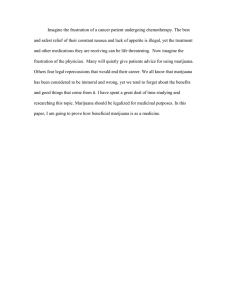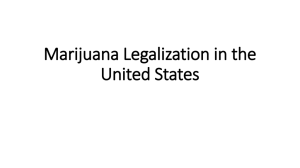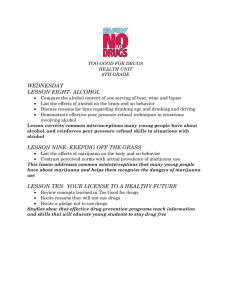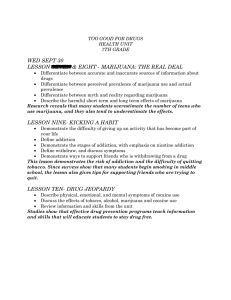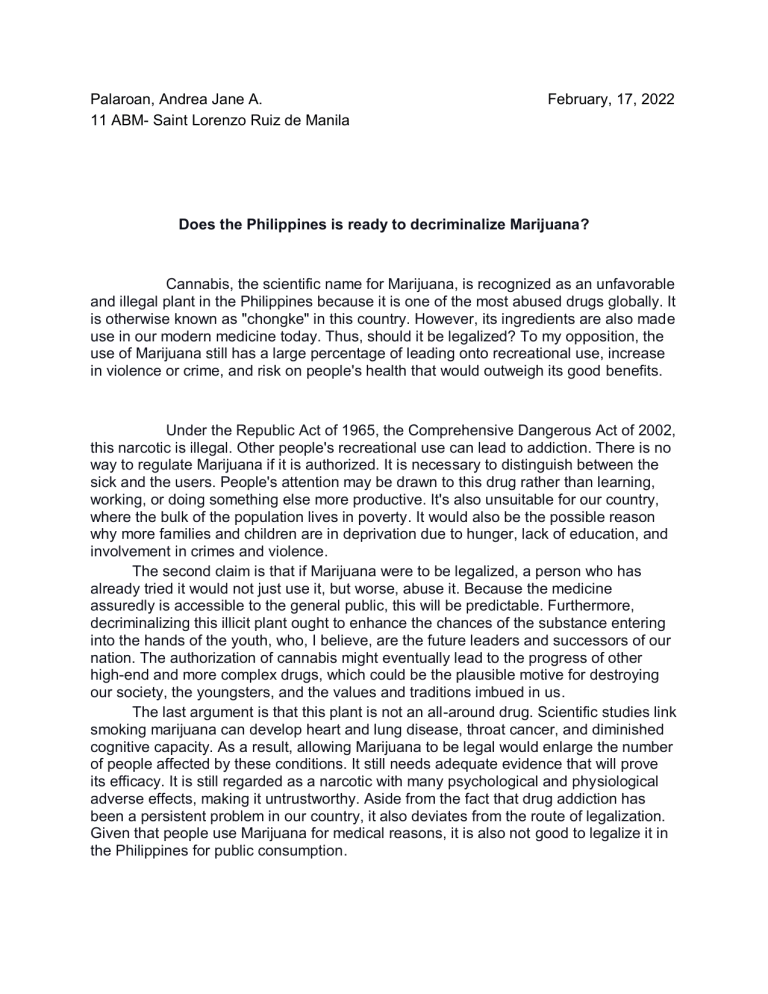
Palaroan, Andrea Jane A. 11 ABM- Saint Lorenzo Ruiz de Manila February, 17, 2022 Does the Philippines is ready to decriminalize Marijuana? Cannabis, the scientific name for Marijuana, is recognized as an unfavorable and illegal plant in the Philippines because it is one of the most abused drugs globally. It is otherwise known as "chongke" in this country. However, its ingredients are also made use in our modern medicine today. Thus, should it be legalized? To my opposition, the use of Marijuana still has a large percentage of leading onto recreational use, increase in violence or crime, and risk on people's health that would outweigh its good benefits. Under the Republic Act of 1965, the Comprehensive Dangerous Act of 2002, this narcotic is illegal. Other people's recreational use can lead to addiction. There is no way to regulate Marijuana if it is authorized. It is necessary to distinguish between the sick and the users. People's attention may be drawn to this drug rather than learning, working, or doing something else more productive. It's also unsuitable for our country, where the bulk of the population lives in poverty. It would also be the possible reason why more families and children are in deprivation due to hunger, lack of education, and involvement in crimes and violence. The second claim is that if Marijuana were to be legalized, a person who has already tried it would not just use it, but worse, abuse it. Because the medicine assuredly is accessible to the general public, this will be predictable. Furthermore, decriminalizing this illicit plant ought to enhance the chances of the substance entering into the hands of the youth, who, I believe, are the future leaders and successors of our nation. The authorization of cannabis might eventually lead to the progress of other high-end and more complex drugs, which could be the plausible motive for destroying our society, the youngsters, and the values and traditions imbued in us. The last argument is that this plant is not an all-around drug. Scientific studies link smoking marijuana can develop heart and lung disease, throat cancer, and diminished cognitive capacity. As a result, allowing Marijuana to be legal would enlarge the number of people affected by these conditions. It still needs adequate evidence that will prove its efficacy. It is still regarded as a narcotic with many psychological and physiological adverse effects, making it untrustworthy. Aside from the fact that drug addiction has been a persistent problem in our country, it also deviates from the route of legalization. Given that people use Marijuana for medical reasons, it is also not good to legalize it in the Philippines for public consumption. Nonetheless, the debate about this issue still goes on. In conclusion, the Cannabis plant should not be decriminalized because our country is not yet ready for this kind of formalization. It would just result from a bigger problem and create many jeopardies, be it on health and safety of the people. As Marijuana is used as medicine to relieve pain, it, too, can be a factor that would contribute to more risky outcomes.
